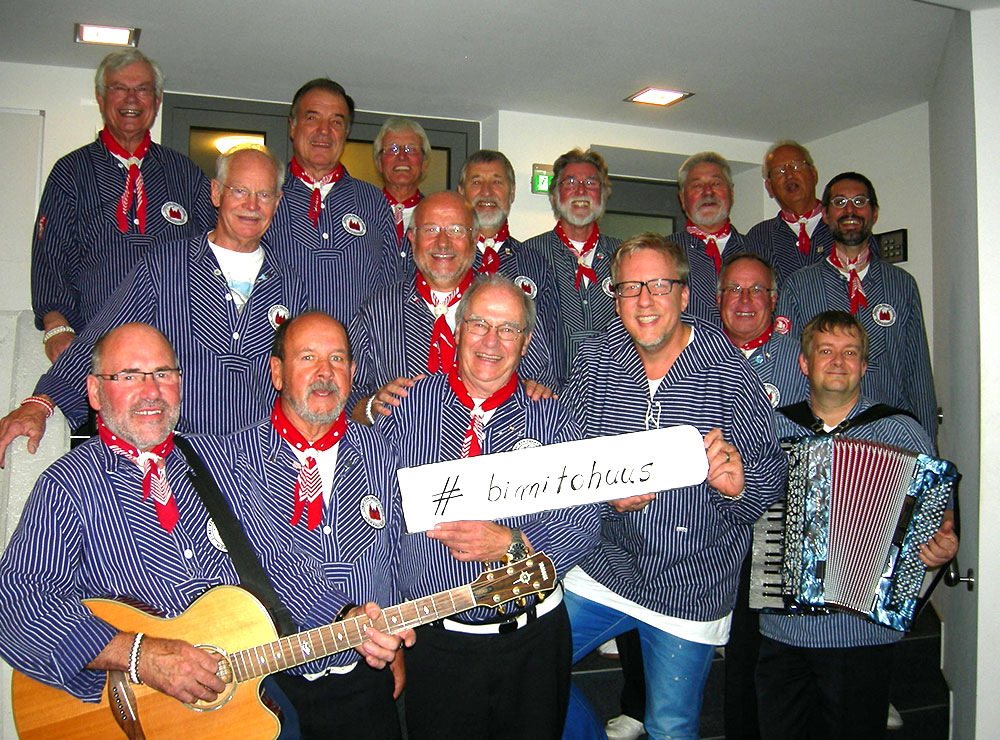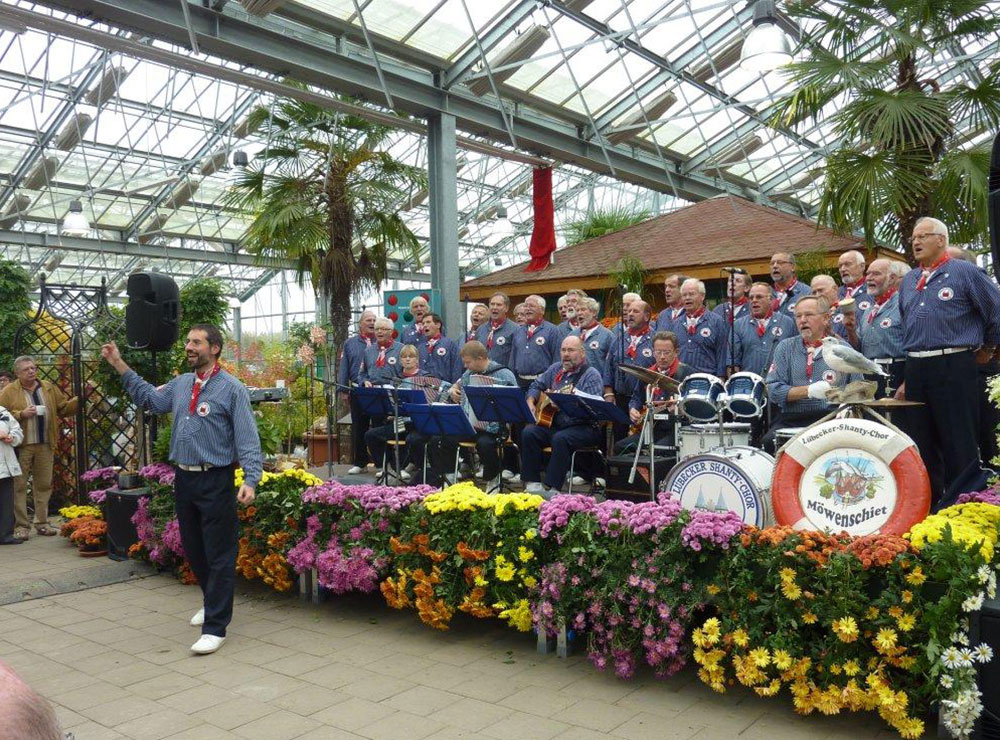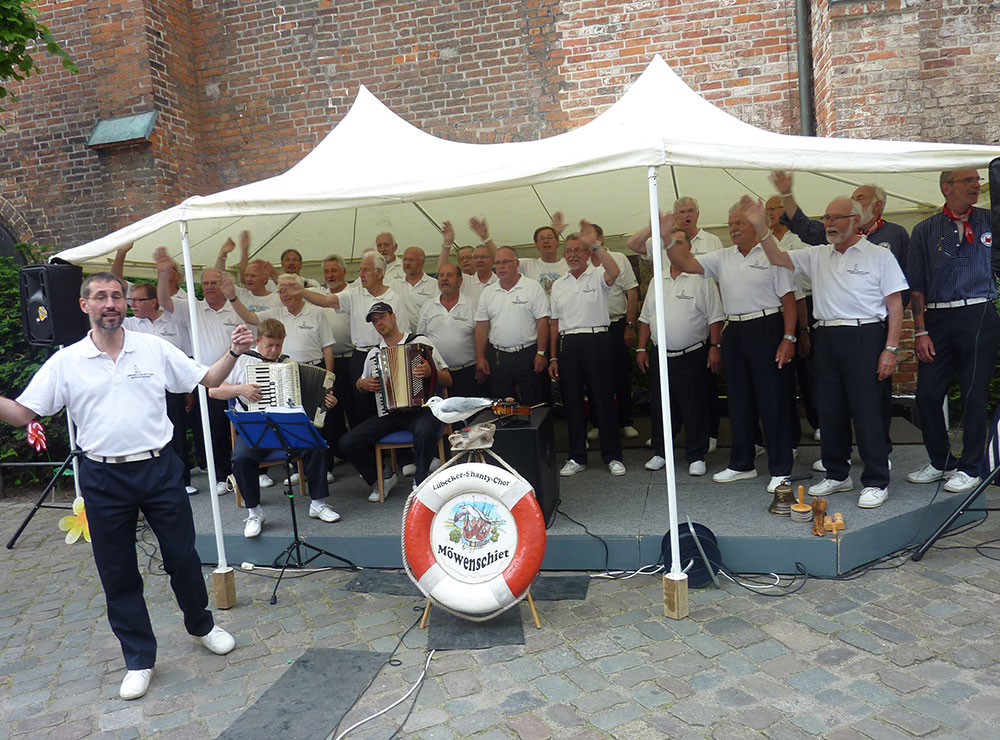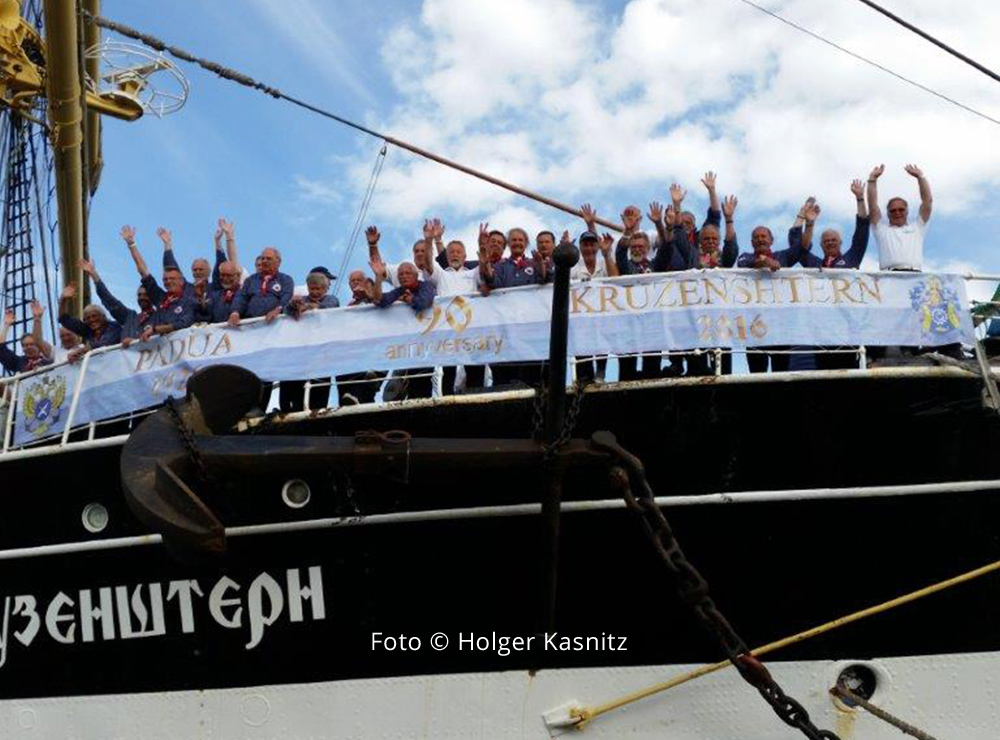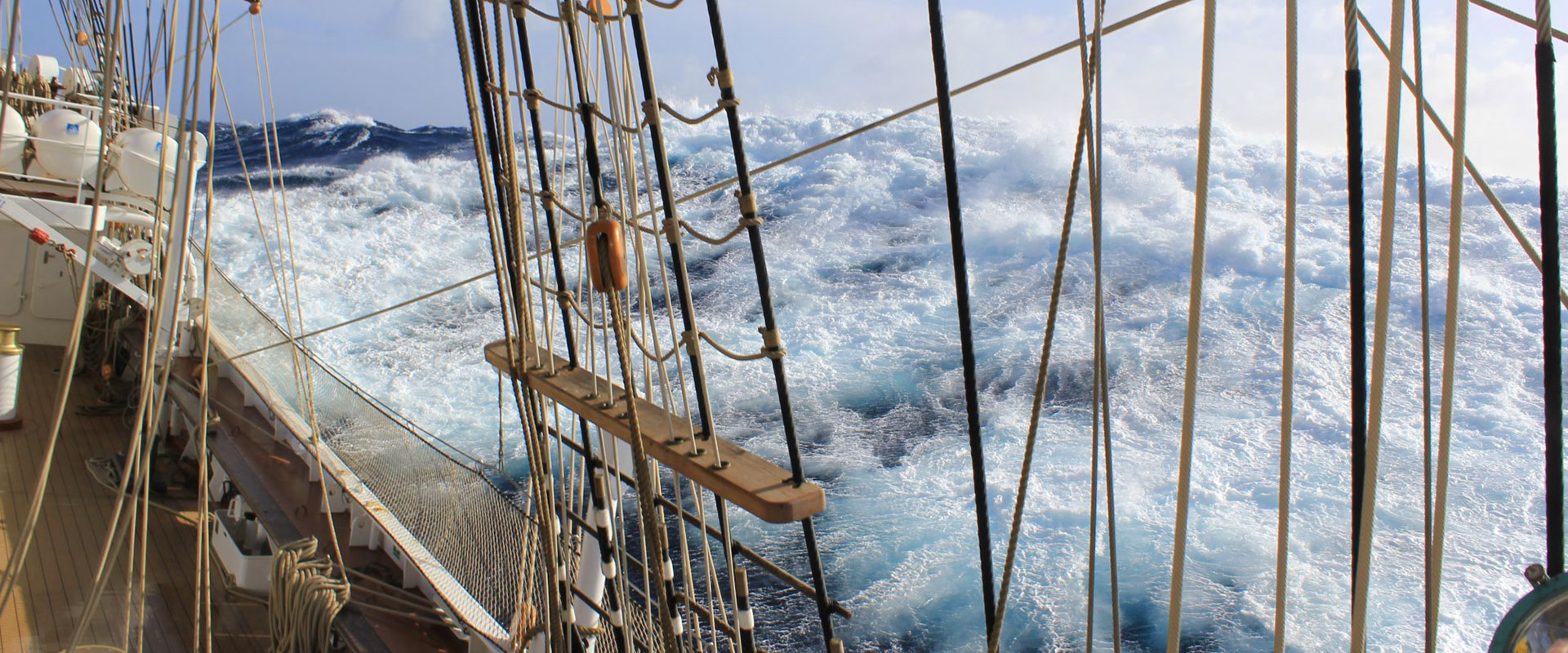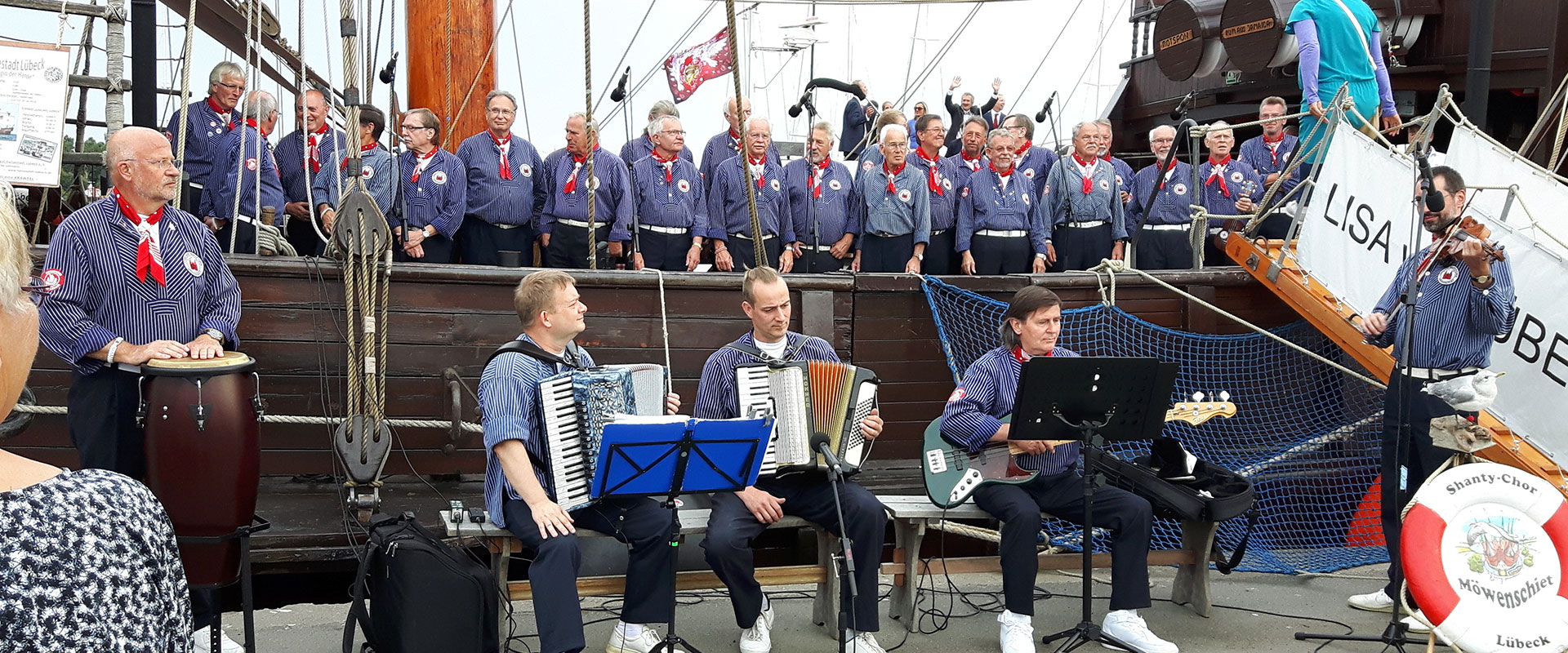
About us
Since the creation of the Lübeck Shanty Choir "Möwenschiet in 1980, the choir was under the direction of Thomas Pohle until 1996. During this time, the choir developed a high standard of quality, so that radio and television became aware of the Möwenschiet choir. Under Thomas Pohle's direction an LP, a single and two CDs were produced.
In 1996 there was a change in the musical management of the choir. The qualified violin teacher Martin Stöhr has since been the director with about 40 amateur singers. Although, until then, the area of shanty music was not his world, the enthusiastic choirmaster has led us to new zeniths.
It is probably a stroke of luck for the choir that this young choirmaster is still open for musical experiments and can overwhelm us with new sound experiences. Anyone who observes our choir director Martin Stöhr at a performance will not fail to notice that a thoroughbred musician is at work. Many shanty choirs envy us for our choirmaster. We hope that we can successfully work together for a long time in the future.
Meanwhile, the choir has produced 2 more CDs as live recordings, representing the mood of the choir when it performs.
For over 35 years the choir has been headed by Egon Ruland, the first chairman. In 2024 he handed over to Harald Rösch.
As a musical ambassador for the Hanseatic City of Lübeck, the choir accompanies the Hanseatic Days at important venues and was there in Mainz when Lübeck was chosen as City of Science. The Möwenschiet choir traditionally opens the Travemunder Sailing Week. We would also like to mention that we entertained the G7 Foreign Ministers with maritime songs in the Lübeck Audience Hall during the preparation for the summit in Lübeck.
To make fun and have fun is our motto.
The story about the founding of the Lübeck Shanty Choir
(formerly Coastline Choir) "Möwenschiet " 40 years ago is:
It is noticeable that many shanty choirs were created in the 1970s. The reasons should actually be researched in more detail. Shanties and various coastal songs were popular favourites by artists such as Hans Albers and Freddy Quinn, by Lale Andersen, Lolita (for example, "Sailor, Your Home Is the Sea") or Melina Mercourt ("A Ship Will Come,"), all well-known songs. Maritime songs also found its audience through literature. The figure of the sailor Kuttel Daddeldu by Joachim Ringelnatz stands for much more here. From this setting, the emergence of "Möwenschiet" is plausible.
Of course, "Möwenschiet" not only has an unorthodox, mischievous and ambiguous name, but also a very unusual origin. If you listen to the story from Rolf Uwe Haschke (* 1959), you immediately have the feeling that “Kuttel Daddeldu” somehow had a hand in the tale. Only the modern Kuttel, now called Ole Pinelle, comes from the pen of Fritz Graßhoff (1913-1997), then known in relevant circles as a draftsman, writer and pianist. He was somehow acquainted with Harry Hockauf, owner of an insider pub in Lübeck's Engelsgrube, which was named after Graßhoff's quirky sailor "Ole Pinelle".
Harry Hockauf wanted to be creative and provide his guests with other exceptional and catching entertainment. He invited Fritz Graßhoff to a reading in his pub and to another on the ship "Passat". The artist requested a shanty choir for the introductory programme. The negotiations then started between Hockauf and the Passat Choir (founded since 1976) but failed due to the amount of the requested fee (allegedly 2,000 DM). Before more good advice became expensive, Harry Hockauf doggedly and pragmatically decided to announce to his regular guests: "We're going to form a Shanty choir, you're all in support!" Rolf Uwe Haschke (*1959), then a 21-year-old, built like a tree, when he recalls this historic hour - the birth of "Möwenschiet”, tears swell in his eyes. The approximately 12 to 15 regular guests, an accurate figure can today no longer be determined, came virtually from a booze mood to "duty obligated". Stephan Fleck, who at the age of 16 was still at school, became the musical advisor to the regular guest’s choir due to his talent, and his brother Peter, owner of the classic car firm "Norden", was also present. Incidentally, Stephan Fleck is currently the choirmaster of the Passat Choir. First choirmaster of Möwenschiet "was Wolfgang Schlicht, who practiced with the choir in the pub " Tube "in the lower Meng street. and appeared at performances shining in a white suit.
A joint weekend action, namely the help in the interior gutting of a Lübeck old town house, yielded the considerable sum of 1,000 DM for the otherwise hard up choir cashbox. From this uniform choir clothes were purchased, as up until then individuals had appeared at initial performances dressed "wildly" in a "sailor pirate look". Harry Hockauf also distributed all tips received into two donation boxes on the counter of the pub, one for the preservation of the ship "Passat" and the other, of course, for Möwenschiet. Incidentally, Fritz Graßhoff had promised to compose a song for "Möwenschiet", probably in the style of "Take me, Captain on the Journey" by Hans Albers, in memory of his emotive and overnight founding of the shanty choir. Unfortunately, he did not keep his promise. But comedy, humor, absurdity and a love of ships, the sea and unusual people, Graßhoff as a character, bequeathed his spiritual heritage to "Möwenschiet".
Even today it is important for the Lübeck-based shanty choir "Möwenschiet" to engage its audience in the performances and to encourage them to sing along, so that the great voyage around the world can be made fun. Since: seafaring is fun even though, in reality today, it is mundane everyday work.
The audience in the MuK, named in the introduction as "guests of honour and sponsors" of the Lübeck Shanty Choir, formed a lively fan community ("All friends on board") and cheered the choir on with storms of applause, which were also directed at a choir member who was marrying his sweetheart far from the Hanseatic city today (via mobile phone transmission: "Dat du mien Leewsten büst"). Egon Ruland, with great experience, tirelessness and prudence, and in the meantime also with paternal all-responsibility the boss and motor of the choir for 35 years, briefly summarised all that the board and musical director, Martin Stöhr, have done to keep the choir together over the long phases of the "lean period" and to make singing together possible. There were practice phases on the spacious grandstand of the VfB Lübeck, in the big tent next to St. Marien, with prescribed distance in Shed C on the Wallhalbinsel, outdoors on the former cemetery grounds next to St. Jakobi or via Zoom Conference/Internet . The crew around Ruland/Stöhr could be sure that no opportunity for practice that somehow presented itself was left unused.
This has strengthened the inner cohesion as a choir "family" on the way from the "Ole Pinelle" pub choir in the Engelsgrube, founded in 1980, to one of the renowned shanty choirs in Lübeck, a member of the Gemeinnützige, the Seamen's Mission Lübeck and the Society World Cultural Heritage Hanseatic City of Lübeck with the Hanseatic Ship "Lisa von Lübeck". Möwenschiet" was in demand, for example, as an "ambassador" of the Hanseatic City at Hanseatic Days, at the celebration of the "Day of German Unity" in Kiel with Chancellor Angela Merkel or to welcome the G7 Foreign Ministers in Lübeck City Hall.
Two personalities in particular have shaped the path from the Waterkant to the Lübeck Shanty Choir. Egon Ruland thanked the choir's musical directors, Thomas Pohle for his great work in building up the choir and Martin Stöhr for his imaginative work in consolidating the choir since 1995. Stöhr has led the choir with verve and humour, motivating his 50 or so men and focusing energetically on his time signatures.
The two-hour programme contained many highlights of maritime folk songs about life at sea or on land. The versatility of the well-known as well as the new pre-singers, the Shantymen, was brilliant. The combo with four accordions, a guitar, drums, conga and ukulele provided harmonious and atmospheric accompaniment.
The audience experienced seafaring in great variability, but not the modern, musically largely not yet worked on time of container and tank ships, when it was said: "Windjammer fahre weit hinaus". But classic shanties, work songs with endless verses that could be sung during long, hard work on board, such as anchor manoeuvres, were also rather rare in the programme. Instead, fast-paced and soulful songs went over the ramp, about the sorrowful or loving life of a sailor, about the "Capitano", about "Johnny", the sailor himself, and of course about the seamanship on the "Gorch Fock", which would have taken the song's author and captain, Freiherr von Stackelberg, "off his horse". And of course the world-famous farewell song "La Paloma". It was about gold rush times ("Santi Anno") and about lovers and wives like "Angelina" or "Irene", especially the famous "Little Eyes". But also stirring events gave "goose bumps" like the rescue of Nis Randers , immortalised in "Home from the sea", or the heart-wrenching fate of "Fields of Athenrey", i.e. the departure of the prison ship from England to Australia. While "Surfin' USA" brought the audience into the break with momentum, towards the end of the event sing-along songs increased the atmosphere in the hall when songs like "Madagascar", "Rivers of Babylon" and the potpourri "Heut geht's an Bord" rang out from around 700 throats. The atmosphere in the large concert hall had reached its peak, so that the "boys" in their fisherman's blouses were not allowed to leave the stage even after the encore "Last Shanty", without guitarist and lead singer "Richie" performing the "Banana Boat" song by Harry Belafonte - with loud support from the standing audience.
Popular maritime cabaret on a large classical stage - a rousing Whitsun festival in "Lübeck, my Lübeck"!

